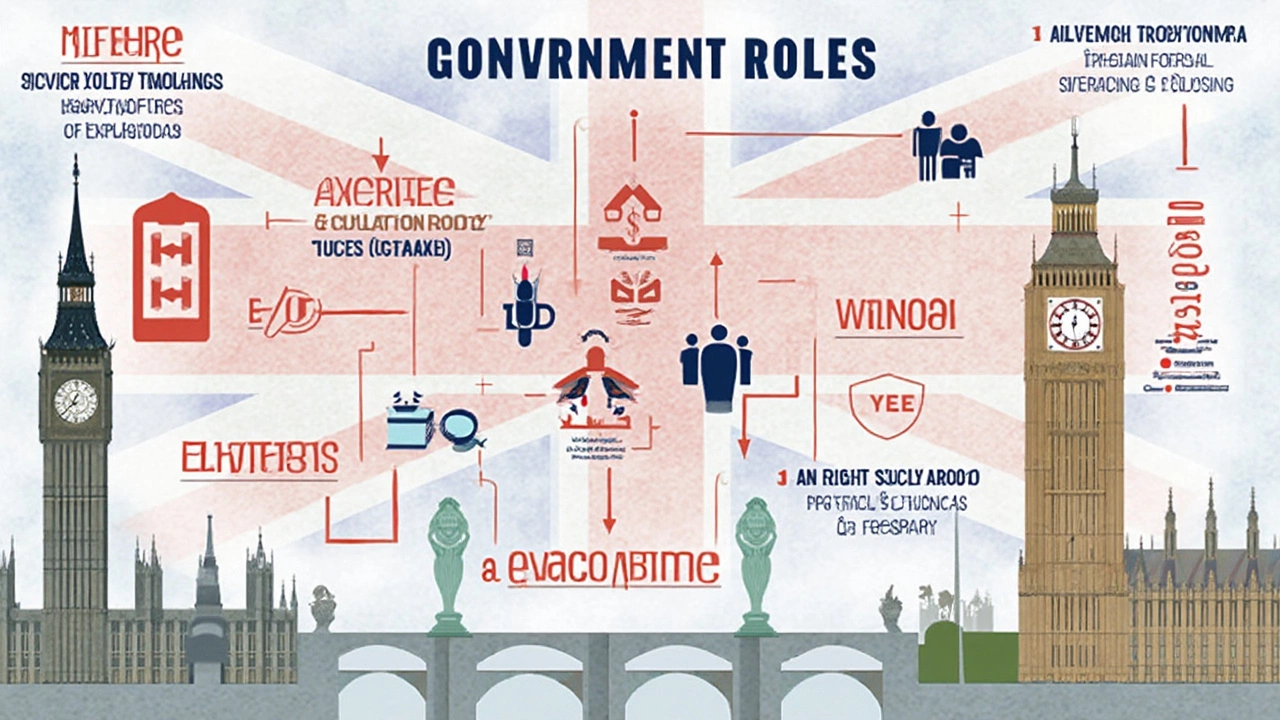If you’re tired of hearing that all government jobs pay the same, you’re in for a surprise. Civil service jobs can range from just-about-enough to pay the bills, to serious six-figure paychecks. Forget about the myth that every civil servant earns peanuts—it’s just not true. The real story? Some jobs in the system pay way more than others, mainly because of responsibility, required skill, or just how tough the job is.
Let’s cut through the noise and get straight to what matters: which jobs bring in the most money, and why. Thinking about your future? Want to know if your degree or background lines up with these top-paying posts? Or maybe you just want to see if it’s worth aiming for the top spot? This is the practical info you need without any waffle.
- Breaking Down the Civil Service Pay Scale
- Top-Paying Civil Service Jobs Right Now
- What Does It Take to Land These Roles?
- Tips for Boosting Your Chances (That Actually Work)
- Is Chasing the Top Salary Worth It?
Breaking Down the Civil Service Pay Scale
Here’s the deal: government jobs don’t follow the free-market chaos. Instead, civil service pay sticks to strict pay grades and set salary bands. If you want to make it big, you’ve got to understand how these levels work or you’ll never break into the upper ranks.
Most civil service jobs in the U.S. use the General Schedule (GS) system. There are 15 grades (GS-1 is the lowest, GS-15 is the highest for rank-and-file jobs), and each grade has 10 pay steps. Want to move up a grade? It usually means years of experience, proven skills, or nabbing a spot no one else wants. Here’s a glimpse of what the GS pay range looked like for 2025:
| GS Grade | Starting Salary | Max Salary |
|---|---|---|
| GS-1 | $22,950 | $28,900 |
| GS-7 | $41,966 | $54,241 |
| GS-12 | $73,349 | $95,364 |
| GS-15 | $130,916 | $170,800 |
What decides your grade? It’s mostly education, experience, and the responsibilities on your plate. For example, someone right out of college lands at GS-5 or GS-7. Mid-career folks with some specialized know-how? They can shoot for GS-11 and above. If you’re heading for senior leadership (think Director or Department Head), you could end up in a whole other pay system called the Senior Executive Service (SES), where salaries stretch well past $200k.
One more thing: where you work matters. Workers in top-cost cities like San Francisco or D.C. get a “locality pay” bump. Sometimes it’s a difference of tens of thousands of dollars between two folks at the same GS grade but in different cities. So, chasing that highest paying government salary isn’t just about your grade—it’s partly about your zip code, too.
Top-Paying Civil Service Jobs Right Now
So, what are the government roles that actually pay the big bucks? A few jobs really stand out when it comes to salary—and no, you don’t need to have been in the game for 30 years to snag one.
Here’s a quick breakdown of jobs that can put you in the top income tier in civil service:
- Senior Administrative Officers / Directors: These folks call the shots. In some agencies, directors pull in over $180,000 a year, not even counting benefits and bonuses. If you see "Chief", "Director", or "Commissioner" in a title, that’s usually code for high earning.
- Medical Officers / Chief Medical Examiners: Government doctors, especially at the federal or state level, can clear $200,000, thanks to both the demand for specialists and the shortage of them willing to work in public roles.
- Specialized Legal Positions: Think federal judges and top legal advisors. Federal judges make between $230,000 and $285,000 depending on their rank.
- IT and Cybersecurity Leads: With the world going digital, top government IT and cybersecurity leaders are earning $140,000 to $190,000. Some tech consultants on contract earn even more.
- Senior Economists and Policy Advisors: On boards like the Federal Reserve or in treasury departments, these folks routinely bring in $160,000 or higher, especially if they’ve got experience from the private sector under their belt.
Here’s a quick glance at what some of these roles actually pay per year:
| Job Title | Average Base Salary | Typical Requirements |
|---|---|---|
| Federal Judge | $230,000 – $285,000 | Law degree, 15+ yrs experience |
| Agency Director | $180,000 – $210,000 | Master’s or PhD, leadership background |
| Chief Medical Officer | $200,000+ | Medical degree, clinical experience |
| IT & Cybersecurity Lead | $140,000 – $190,000 | Bachelor’s or higher, certifications |
| Senior Policy Advisor | $160,000+ | Relevant degree, policy experience |
It’s also worth pointing out that many of these jobs come with generous non-cash perks: strong pensions, great healthcare, and paid vacation time that private companies rarely match. If you’re aiming for these spots, you usually need a mix of experience, advanced degrees, and sometimes a good network.

What Does It Take to Land These Roles?
Nabbing the highest paying civil service job isn’t about getting lucky. There’s a roadmap—experience, degrees, tests, and hustle. If you’re thinking it’s just about having a diploma, think again. The truth is, moving up the ladder means ticking specific boxes, some of which aren’t obvious until you’re knee-deep in the process.
For starters, jobs like Senior Administrative Officer, Chief Financial Officer, or even Director roles usually demand a solid university degree—something in law, business, finance, or public administration. A lot of the top dogs also have a master’s or even a PhD. And it’s not just about the paper, but what you do with it. Relevant work experience, especially in leadership or policy, is huge. HR folks want to see you’ve handled tough problems before.
Most civil service jobs run on an exam system. The tougher the job, the trickier the test. Think competitive written exams, deep-dive interviews, and sometimes even psychometric assessments. It’s not one-size-fits-all, but here’s a look at what usually crops up if you’re chasing top salary roles:
- Written exams on government policies, law, current affairs, or specialty areas.
- Panel interviews testing your resolve and how you handle crisis or conflict.
- Background checks—honesty and loyalty matter big time for high-trust jobs.
- Years of related work experience (often 7-15 years for director and C-suite jobs).
- Sometimes, professional licenses (like CPA for Chief Financial Officer).
Want some real numbers? Here’s a quick peek at what kind of requirements you’re looking at for the best-paid jobs:
| Job Title | Typical Education | Experience Needed | Extra Requirements |
|---|---|---|---|
| Senior Administrative Officer | Master’s in Public Admin | 8-12 yrs relevant work | Tough written/oral exams |
| Chief Financial Officer | CPA, Master’s in Finance | 10+ yrs financial management | Proven leadership, background check |
| Director of Legal Affairs | Law degree, Bar exam | 10+ yrs legal work | Panel interview, references |
Getting into those high ranks is a marathon, not a sprint. If you want those jobs, start stacking up the right qualifications and experience now. Networking helps too, but results and reputation go the furthest when you’re aiming for the best-paid roles in government.
Tips for Boosting Your Chances (That Actually Work)
Want a shot at those top government paychecks? You can’t just wing it. The truth is, folks who grab the highest paying civil service jobs almost always follow a few proven moves—no shortcuts, just strategic effort. Here’s what actually works, based on real world examples and insider advice:
- Specialize and Upskill: Most of the best-paying civil service gigs—think Senior Administrative Officers, IRS Commissioners, or Chief Engineers—want skills that stand out. Credentials like a law degree, a master’s in public admin, or a certified engineering license will put you in a league above typical applicants.
- Know the Exam Game: The big jobs have their own written exams and interviews. For example, the Indian Administrative Service (IAS) main exam is infamous for how tough it gets after the prelims. Study guides, online mock tests, and even old question papers (sometimes posted on official websites) can make a real difference.
- Network With Purpose: Knowing people doesn’t mean cheating the system; it means learning from those already inside. Join forums, professional groups, and LinkedIn networks focused on civil service. A lot of mentorship happens on these platforms—for free.
- Stay Updated on Openings: Jobs with big salaries aren’t always advertised months in advance. Some positions in the US federal government, for example, only post for a week on USAJobs.gov. Set alerts and check regularly.
- Polish That Resume: Civil service agencies look for specific keywords—leadership, policy analysis, compliance, budgeting—especially on applications for the highest paid roles. Tiny resume tweaks can bump your profile to the top of the pile.
If you’re curious where your effort might pay off, here’s a quick look at the education and exam requirements for a few of the highest paying civil service jobs:
| Job Title | Minimum Education | Main Requirement |
|---|---|---|
| IAS Officer (India) | Bachelor’s Degree | Clearing UPSC Civil Services Exam |
| IRS Commissioner (US) | Bachelor’s (Often Graduate Degree) | Professional experience, structured interview |
| Senior Administrative Officer (UK) | Bachelor’s Degree | Fast Stream Assessment or external recruitment |
| Chief Engineer (Singapore Civil Service) | Engineering Degree | License, interviews, technical exam |
The main thing? Be prepared, stay sharp, and know exactly what these roles require before you even apply. I’ve met people who thought passion alone would get them in, but the ones who succeed are usually the ones who tick every box on these lists.

Is Chasing the Top Salary Worth It?
It sounds awesome to land that highest-paid slot in civil service, but it’s not as simple as cashing a fat paycheck and living happily ever after. There’s more on the table—like the real stress, crazy responsibility, and sometimes constant on-call hours that come with those six-figure jobs. You know the saying: there’s no such thing as easy money, especially in government work.
The majority of senior-level civil service jobs—think Directors, Commissioners, or Chief Engineers—ask for more than just a strong resume. We're talking advanced degrees (sometimes double master’s), years of climbing the ladder, and proving you’ve got the grit to handle politics, public scrutiny, and major projects. Even then, job security is never 100%, especially when election cycles roll around and leadership swaps out what feels like overnight.
| Position | Typical Annual Salary | Years of Experience Needed |
|---|---|---|
| Federal Executive (SES Level) | $140,000 - $210,000 | 15+ years |
| State Department Director | $120,000 - $185,000 | 12+ years |
| Chief Medical Officer (Public Health) | $160,000 - $230,000 | 10+ years, medical degree |
Here’s a straight-up tip: Don’t just hunt for the top dollar if you hate meetings, can’t stand pressure, or want a predictable 9-to-5. Some mid-level jobs in the civil service pay pretty well, offer work-life balance, and still give solid retirement perks. Nurses in the Veterans Health system, for example, can make $95k with a regular schedule—way better than suffering through a director role you dread.
Ask yourself these questions before you go after a top-paying slot:
- Am I cool with constant calls after hours?
- Can I handle tough calls in front of the media or big bosses?
- Am I ready to change locations if the job requires?
- Do I actually enjoy the idea of leading teams and massive budgets?
Plenty of folks end up climbing, only to realize the view from the top isn’t what they expected. The pay is sweet, but so is having weekends to see your friends, hang out with family, or just relax. Sometimes, stability, satisfaction, and a solid routine beat being the highest paid in the building.





Write a comment